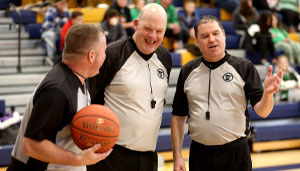Coaches and Certified Athletic Trainers: An Important Relationship
By Alex Zettlemoyer on November 07, 2014 coaches PrintThe working relationship between coach and athletic trainer must be cemented in mutual trust and confidence that each is working for a common goal – a successful athlete. All too frequently, the athlete is placed in a position between coach and athletic trainer. The athlete and parents are forced to take sides and the coach/athletic trainer relationship becomes dysfunctional. This dysfunction in the coach/athletic relationship could hinder the entire program from reaching its potential. The coach and athletic trainer must strive to understand one another’s perspectives while working collaboratively to ensure the athlete’s safe participation.
In interviews with coaches and parents, several core attributes can be identified for a successful relationship. These include effective communication, investment or commitment to the program, professional knowledge and integrity. Clearly, these traits can help any relationship and are especially helpful when considering the health and safety of the student-athlete.
Though seemingly self-explanatory, the importance of effective communication cannot be understated. All too often, the root of most misunderstandings can be traced to miscommunication. For both the athletic trainer and coach, exceptional communication is a must. This can be particularly difficult in high school/middle school setting where the ratio of athlete to athletic trainer is typically quite high. Compounding this issue, the athletic trainer may not see a particular coach every day. Certainly, technology has helped alleviate some of these concerns and usually either party can reach the other via cell phone, text or email.
Both the coach and athletic trainer can and should go out of their way to communicate effectively. Coaches should have high expectations of the athletic trainer in regards to communication. It is important for the athletic trainer to update athlete injury status regularly.
Coach/athletic trainer conversations should not be limited to talk of injured athletes, but also include discussions about safe participation, practice and game expectations, athletic trainer location/availability as well as any other concerns. Additionally, the athletic trainer should make the coach aware of changing weather conditions that may affect games or practices. Furthermore, it is also helpful for coaches to inform athletic trainers about changes in practice times and to consider consolidating practices during holidays and weekends when possible.
Trust in a relationship has to be built over time. Simply stating that one is invested in the program or community shows little in the way of proof. It goes without saying that coaches are committed to the success of their program. What is harder to quantify is the commitment of the athletic trainer. Surely, the athletic trainer has the best interest of the athlete in mind and this can sometimes force the unpopular decision that removes a player from a contest.
Athletic trainers must work hard to prove to coaches, parents and athletes that these decisions are not made lightly and the best interest of the athlete is paramount. The athletic trainer must weigh risk vs. reward, but he or she is always dedicated to safe participation – NOT removal from play for the sake of exclusion.
Trust, again, is built on great communication. When all parties have clear expectations about the care and return to play of an injured athlete or the safety of all athletes, trust will be built. Coaches can help in this regard as well. Typically an athlete will talk to the coach prior to reporting to the athletic trainer, informing him/her of the injury and their desire to seek treatment.
Coaches can and should allow the athletic trainer to fully evaluate that athlete and develop a treatment plan. Sending the athlete to the athletic trainer with instructions to “just tape it,” sending the athlete directly to his/her physician, or trying to manage the injury himself sends the message that the athletic trainer is not trusted. In turn, the athletic trainer becomes resentful of the coach and says something to the effect, “I don’t tell your coach what plays to call and he/she shouldn’t tell me how to manage the injured athlete.” And so the downward spiral begins…
The athletic trainer is a highly educated health-care provider who is tasked with the overwhelming responsibility of providing quality care to athletes. Often, the athletic trainer works alone or with small staffs that are responsible for the welfare of the athletes. Moreover, the athletic trainer must provide that care throughout a school’s entire athletic program. A tenet of the athletic trainer is continuing education as it relates to the profession. The athletic trainer should work to continually pass that education on to staff, coaches, athletes and parents on all issues related to health and safety. Coaches should acknowledge that athletic trainers are working as hard as their athletes and the coaching staff to return that athlete to safe participation.
Integrity should be a key principle for both coach and athletic trainer. Both parties show their integrity though adherence to school, athletic, personal and professional ethics. Each must uphold these standards and have the confidence the other is acting in a like manner. Although a coach might need a player to win a game, the safety of the athlete should never be compromised for a team need.
Interestingly, both coaches and athletic trainers go through the interview process for their respective positions and are rarely asked how they are going to forge the kinds of bridges discussed in this article. Specifically, good communications skills, how to build trust or show commitment to the institution is rarely emphasized in otherwise rigorous athletic training academic programs. Coaches, too, may be great motivators and strategists but lack these basic skills as well. Like anything, these skills require practice. With practice comes mastery for which not only the coaches and athletic trainers benefit, but the program, and ultimately the athletes, will succeed. Inversely, without these skills a program and its stakeholders will be challenged to reach their fullest potential.
Alex Zettlemoyer
Alex Zettlemoyer is the head athletic trainer for Mechanicsburg Area School District in Mechanicsburg, Pennsylvania. He has been with Mechanicsburg since 1995 and a certified athletic trainer since 1994. Zettlemoyer is Pennsylvania Interscholastic Athletic Association championship athletic trainer as well as frequent lecturer on contemporary athletic training topics. For more information, contact Zettlemoyer at [email protected].
Most Recent Articles
- nfhs news NFHS Learning Center Delivers 25 Millionth Course
- Track & Field/Cross Country article Effective Communication with Athletes and Coaches
- nfhs news Player Equipment Changes Highlight 2025 High School Football Rules Revisions
- Player Equipment Changes Highlight 2025 High School Football Rules Revisions
- nfhs news Judgment Call on Second Contact Eliminated in High School Volleyball






